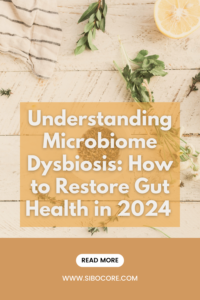In recent years, the term “microbiome” has become a buzzword in wellness circles, and for good reason. Your microbiome—the collection of microorganisms living in and on your body—is an essential player in your overall health. From aiding in digestion to supporting your immune system, these tiny organisms hold the key to how well you feel, physically and even mentally. But when things go off-balance—hello, SIBO dysbiosis—it can throw everything into chaos. Let’s dive into what this means for you and, more importantly, how you can get things back on track.
What Exactly Is the Microbiome?
The human microbiome refers to the trillions of microbes that live in harmony with our bodies. While they reside throughout the body, the gut is their central hub. A healthy, balanced gut microbiome is like a well-tuned orchestra, playing a symphony that keeps our digestion, immune system, and even mood in check.
Here are some of the remarkable things a healthy microbiome does:
-
- Supports digestion: Helping break down complex foods and absorb nutrients.
-
- Boosts immunity: Teaching our immune system how to respond to threats.
-
- Produces essential compounds: Such as vitamins and anti-inflammatory molecules like short-chain fatty acids.
-
- Acts as a bodyguard: Protecting us from harmful pathogens by outcompeting them for resources.
Why Does Dysbiosis Happen?
Dysbiosis occurs when this harmonious microbial community falls out of balance. Picture this: the beneficial microbes are outnumbered by harmful bacteria or fungi, and suddenly the beautiful symphony becomes a chaotic noise.

So what causes this imbalance?
-
- Diet: Eating processed foods high in sugar and unhealthy fats can starve the good bacteria, allowing harmful ones to flourish.
-
- Antibiotics: While life-saving, antibiotics often wipe out both good and bad bacteria, leading to an imbalance.
-
- Stress: Chronic stress impacts the gut, creating a less hospitable environment for beneficial bacteria.
-
- Infections or toxins: These can directly kill or disrupt healthy microbes, leading to further problems.
How Dysbiosis Affects You—From Your Gut to Your Mood
When dysbiosis takes over, it doesn’t just affect the gut. Its ripple effects are felt throughout the body:
-
- Digestive problems: Conditions like irritable bowel syndrome (IBS), bloating, and indigestion are often linked to dysbiosis.
-
- Metabolic issues: Research suggests that an imbalanced microbiome may contribute to obesity, diabetes, and other metabolic conditions.
-
- Mental health: The gut-brain axis connects our gut health with our mental health. Dysbiosis is associated with mood disorders like depression and anxiety.
-
- Autoimmune diseases: An imbalanced gut microbiome can lead to immune system dysregulation, contributing to autoimmune diseases and chronic inflammation.

Easy Ways to Bring Balance Back to Your Gut
The good news? Your microbiome is adaptable, and there are steps you can take to restore balance:
-
- Eat a diverse, fiber-rich diet: Foods like vegetables, fruits, legumes, and whole grains feed your beneficial microbes.
-
- Incorporate fermented foods: Yogurt, kefir, and kimchi can introduce beneficial bacteria to your gut. – True gut health foods!
-
- Consider probiotics and prebiotics: Probiotics provide beneficial bacteria, while prebiotics (fiber) feed them.
-
- Limit antibiotic use: Only take antibiotics when necessary and consider replenishing your gut bacteria afterward with healthy foods and probiotics. (Unless of course, you actually need an antibiotic, for example when treating SIBO).
-
- Manage stress: Practicing mindfulness, meditation, or yoga can positively affect your gut.
Conclusion
Your microbiome is not just a passive passenger in your body—it plays an active role in maintaining your health. When it falls out of balance, as in the case of dysbiosis, it can lead to a wide range of health problems. However, by making conscious choices about diet, lifestyle, and stress management, you can foster a healthy, balanced microbiome and enjoy better overall health.
Taking care of your gut isn’t just about digestion—it’s about taking care of your entire body. When your microbiome thrives, so do you.

